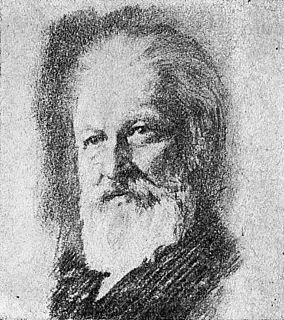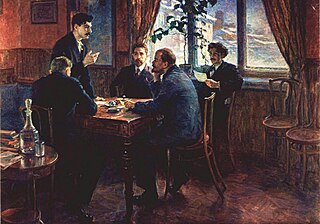Related Research Articles

The Bolsheviks, also known in English as the Bolshevists, were a far-left, revolutionary Marxist faction founded by Vladimir Lenin that split with the Mensheviks from the Marxist Russian Social Democratic Labour Party (RSDLP), a revolutionary socialist political party formed in 1898, at its Second Party Congress in 1903.
The history of the Communist Party of the Soviet Union was generally perceived as covering that of the Bolshevik faction of the Russian Social Democratic Labour Party from which it evolved. The date 1912 is often identified as the time of the formation of the Communist Party of the Soviet Union as a distinct party, and its history since then can roughly be divided into the following periods:

Vladimir Dmitriyevich Bonch-Bruyevich was a Soviet politician, revolutionary, historian, writer and Old Bolshevik. He was Vladimir Lenin's personal secretary.

Gleb Maximilianovich Krzhizhanovsky was a Soviet scientist, statesman, revolutionary, Old Bolshevik, and state figure as well as a geographer and writer.
Rabochy was an illegal Bolshevik newspaper, organ of the district organisations of the Russian Social Democratic Labour Party in the Vyborg and Petersburg Districts of St. Petersburg. The newspaper was published from February 26, 1907, by decision of the St. Petersburg Committee of the R.S.D.L.P. as a mass popular organ. From April 1907 the combat organisation of the St. Petersburg Committee of the R.S.D.L.P. participated in the publication of the paper. Lenin, Y. M. Yaroslavsky and other Bolsheviks were contributors. At the beginning of June 1907 its press was confiscated by the police and publication ceased.
Proletariatis Brdzola was an illegal Bolshevik newspaper. Proletariatis Brdzola was the organ of the Caucasian League of the Russian Social Democratic Labour Party. It was founded in connection with the 1st congress of Caucasian League. The paper was the result of the fusion of two illegal publications, the Georgian Brdzola and the Armenian Proletariat.

Alexander Grigorievich Schlichter was a Ukrainian Bolshevik politician, Soviet statesman, political scientist and economist.

Yemelyan Mikhailovich Yaroslavsky was a Bolshevik revolutionary, Communist Party functionary, journalist and historian.

The 3rd Congress of the Russian Social Democratic Labour Party was held during 25 April - 10 May [(12–27 April O.S.)] 1905 in London, UK.

Rosalia Samoilovna Zemlyachka, née Zalkind was a Russian revolutionary and Soviet politician. As a revolutionary, she was best known by the alias Zemlyachka, though she also used the party pseudonyms 'Demon' and 'Osipov', and her married name was Samoilova.
Pravda is a Russian broadsheet newspaper, and the official newspaper of the Communist Party of the Soviet Union, when it was one of the most influential papers in the country with a circulation of 11 million. The newspaper began publication on 5 May 1912 in the Russian Empire, but was already extant abroad in January 1911. It emerged as a leading newspaper of the Soviet Union after the October Revolution. The newspaper was an organ of the Central Committee of the CPSU between 1912 and 1991.

Mikhail Pavlovich Tomsky was a factory worker, trade unionist and Bolshevik leader and Soviet politician. He was the Chairman of the All-Union Central Council of Trade Unions in the 1920s.

Lev Borisovich Kamenev was a Bolshevik revolutionary and a prominent Soviet politician.
The Mezhraiontsy, usually translated as the "Interdistrictites," were members of a small independent faction of the Russian Social Democratic Labor Party (RSDLP), which existed between 1913 and 1917. Although the formal name of this organization was Russian Social Democratic Labor Party (Internationalists), the names "Mezhraionka" for the organization and "Mezhraiontsy" for its participants were commonly used to indicate the group's intermediate ideological position between the rival Menshevik and Bolshevik wings of the divided RSDLP.
The 2nd Congress of the Russian Social Democratic Labour Party was held during July 30–August 23 1903, starting in Brussels, Belgium and ending in London. Probably as a result of diplomatic pressure from the Russian Embassy, Belgian police had forced the delegates to leave the country. The congress finalized the creation of the Marxist party in Russia proclaimed at the 1st Congress of the RSDLP.

The Russian Social Democratic Labour Party, also known as the Russian Social Democratic Workers' Party or the Russian Social Democratic Party, was a socialist political party founded in 1898 in Minsk.

Mikhail Stepanovich Olminsky was a prominent Russian Bolshevik particularly involved with Party history and also an active literary theorist and publicist.

The first conference of the Russian Social Democratic Labour Party (RSDLP) took place in Tampere (Tammerfors), Grand Duchy of Finland, in December 1905. Held between the 1905 London and 1906 Stockholm party congresses at the Tampere Workers' Hall, the conference was an unofficial meeting of the Bolshevik faction of the party. It is particularly remembered for playing host to the first meeting of Vladimir Lenin and Joseph Stalin. The conference resolved to forgo participation in the new State Duma, as did most of the far left parties. They later reversed this decision in 1907.

Nikolai Gurevich Tolmachyov was a Russian Bolshevik revolutionary and participant of the February and October Revolutions, the Civil War. He was a political worker of the Red Army and one of the first military commissars.
Virgil Leonovich Shantser was a Bolshevik revolutionary active in the Moscow uprising of 1905. He became a leading Bolshevik, but followed Alexander Bogdanov into the Vpered faction in 1909. However he contracted an illness and died in 1911.
References
- ↑ Biggart, John (1981). "Anti-Leninist Bolshevism: the Forward Group of the RSDRP". Revue Canadienne des Slavistes. 23 (2): 134–153.
- ↑ Vladimir Lenin, The Social-Democratic Election Campaign in St. Petersburg, Prostiye Rechi, No. 2.